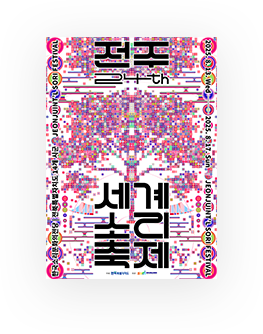d-day
D
+
291


2025. 8. 13. Wed - 2025. 8. 17. Sun

60 Minute
Free
All Ages Admitted
Various Jeonbuk-style Pangut Stages Plus Gangneung Nongak from Yeongdong Province!
Exciteful Pungmul Stages for Five Days of Sori Festival Period
Nongak (lit. farmers’ music) that has been traditionally performed to pray for the harmony, prosperity, and peacefulness of the village community became developed into Korea’s representative performing art genre. Nongak is a synthetic art from in which performers march or act while playing percussive instruments such as kkwaenggwari, jing, janggu, buk, sogo, etc.. The ensemble-format, rhythm, play style, costumes of nongak bands vary from village to village. It was designated as a UNESCO Intangible Cultural Heritage in November 2014.
During the 2024 Jeonju International Sori Festival period, a variety of pangut (lit. field for ritual-like performance) sub-styles from Jeonbuk Province will be performed. The audience will be able to meet Honam-udo nongak (from Iri and Gochang), Jeolla-jwado nongak (from Jinan), Baekjungnori (also known as Jeonju-gijeopnori) plus Gangneung Nongak from Yeongdong Province (i.e., the eastern part of Gangwon-do region). During the five days of Sori Featival, let us experience the excitement and beauty of traditional arts through enjoying this “pungmulgut (lit. percussive music-ritual) fever” performances that symbolize harmony, unity, and enthusiasm.
Gangneung Nongak
Gangneung Nongak is the only form of nongak from Gangwon-do Province included in the list of the National Intangible Cultural Heritage. It is characterized by its fast and cheerful melody and its unique form as a performative description of agricultural process that cannot be found in other regions. In addition, sogo and beopgo percussions as well as hats are still made by hand to preserve their originality. In Gangneung Nongak, unlike Utdari Nongak where the performers acts dandonggori and samdonggori (forms of putting younger performers on one’s shoulder), the performers together build a tri-levelled human tower and then the one standing on the top twirls a sangmo hat, providing the audiences with a differentiated point of attraction that cannot be found in other cases.